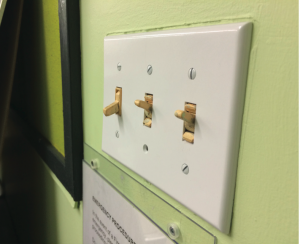
So, I was stuck sitting between two political aficionados at a Mooseheads game the other night. I’m a solid B-student when it comes to Whigs, Tories, and the like, so I found their conversation to be a mildly interesting distraction as I got drunker and prayed for a hockey brawl to spice things up. I kept pretty quiet, until one of the guys brought up The West Wing, entering much more familiar territory. I perked up, eager to throw in my two cents.
This may be controversial, but I cannot stand Aaron Sorkin’s work. ANY of it. This is mainly due to his treatment of female characters: they just aren’t very well-developed and often appear silly, needy and reliant on their knowledgeable, indulgent male friend, who they might not have fucked yet but probably will in the future. That’s what the ladies of Sorkin’s worlds are – eventual sperm banks for the condescending jackasses who pat them on the head, secure in the knowledge that dicks possess mystical intelligence and competence boosting properties tragically unknown to those cursed with a uterus. (In a limited defense of Sorkin, C.J. Cregg had her moments, but I give credit for that to the amazing Allison Janney.)
For a glaring reminder of everything that Sorkin’s work lacks, consider a far superior show that involves ladies and politics: House of Cards. Claire Underwood could utterly destroy any Sorkin man with a withering look and one clipped, cold sentence.
But I have veered off topic. This article is not about an over-rated douchenozzle – that kind of hate parade deserves an article to itself, and it is not the topic today. At the hockey game, in the middle of the Sorkin talk, I brought up my issues with his treatment of women briefly, but I chose not to say much else. It was a knee-jerk reaction. I made a few more comments throughout the night that were flavored with feminism, but I never pushed for a lengthy conversation. It wasn’t until the end of the night that I realized what I was doing: I was shutting myself up so I wouldn’t talk that much about feminism around two guys. I have to make it very clear, the two guys gave no indication of having an issue with feminism – in fact I have plenty of convincing evidence to know they wouldn’t mind such a conversation. This self-censorship was coming from the depths of my own strange, contradictory brain.
See, I’ve been conditioned to not yell too much about women’s issues. You can talk about them to a certain degree, the logic goes, but men don’t want to hear about them, so don’t push the subject.
It’s not like I was raised in the Dugger family or anything. I was raised around strong, opinionated women. Unfortunately, I was also raised by Beverly Hills 90210, Seventeen magazine (and its many clones), and umpteen other examples of pop-culture conditioning that penetrated my brain to the core.
The general idea these influences promote is that it’s ok to have safe opinions, like that women should be able to vote, work, and make their own life choices … but having a boyfriend is still SUPER crucial, and there are do’s and don’ts for being a feisty girl in a relationship. You should voice your opinions to a certain degree – but don’t be too forceful, and try to avoid challenging guys, because it’s just not cute.
Smart enough and desirable, but ultimately non-threatening – you are supposed to be a Sorkin girl, essentially.
I was raised with this bullshit, along with other spoken and unspoken rules – wear makeup, shave your legs and armpits if you don’t want to be an embarrassment, etc. This stuff was practically Clockwork Oranged into my head. Naturally, it fucked with me as I got older. A few years ago, I began questioning everything about this behaviour. Why did I have to shave my legs? Why did I downplay all my feminist feelings around guys?
I eventually came to terms with these questions, and I even thought I was cured of the fuckwittery that marked my teenage years. I only indulge in shaving and makeup when I feel like it now, and I am loud and opinionated when I have something to say.
This is why my unintentional self-censorship at the hockey game was so shocking. Did the regression have to do with the fact that one of the guys was my fiancé, and I’ve been conditioned to impress him? We have completely unfiltered conversations all of the time, so that seems unlikely. Was it perhaps that in public, in a group, I was more inclined to revert to the sort of role society expected of me in that situation? Maybe, in part, but I’ve spoken up in similar situations in the past, so that’s not the whole answer.
Honestly, I don’t know the answer, and I think that confusion might actually be the lesson here. Undoing years of societal training isn’t as simple declaring yourself a feminist and thinking you are over it. There is no switch to flick that resets your brain. Moving forward is a complicated process, and a struggle, and it requires ongoing self-reflection.
I’m ending this article now—I have some more reprogramming to do. A few replays of Queen Latifah’s Black Reign should make for a solid start.







